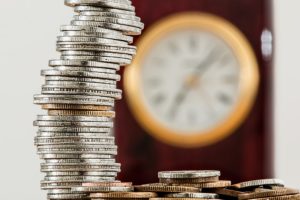Special to the Financial Independence Hub
When it comes to actionable personal finance habits, earning more money and saving a good portion of it are near the top of the list. Sadly though, before you can ascend the tower of wealth, many of us need to first dig out of the basement of debt.
Escape Debt in 5 years
Did you know the average American household has approximately $137,063 in debt? (all figures $US.) That’s too much debt. But what if you were to discover it’s possible for the average household to get out from under the thumb of that kind of debt in as little as five years?
There are several ways to do this. Loan consolidation is a practice whereby you reduce the complication of managing debt by combining everything together. If you have a bunch of little debts that individually compound separately from one another, one possible solution could be to take out a small loan, pay them off, then pay off the small loan in a single payment from then on.
There are online loans of this type which can, believe it or not, be secured online, if you’re considering such.
Still, this is just a debt transition; it doesn’t truly get rid of that which you owe: it merely reduces the complexity of paying a dozen little things off in tiny increments; like cellphones, furniture, and medical bills. A better way to get your debt paid off more quickly is to downsize.
Debt Relief Strategy
This is where you have to establish good financial habits. This hypothetical revolves around $3,000 a month in earnings from the primary breadwinner of the household. That comes to $36,000 a year before taxes. Now say you’ve got $137,000 in debt hanging over your head. You need to find a way to pay that off with the money you’ve got.
In five years, you will have made $180,000 through a job that pays $3,000 a month, or $36,000 annually. If you can reduce your annual budget to $8,600 a year, you can pay off the debt in five years: assuming, of course, that the $137,000 figure is an overall projection throughout the time, which includes accumulated interest.
But how is that possible with mortgages at $1,500 a month, gas at $3 or more a gallon, and rising food costs? Well, the first thing you might do is get rid of your mortgage. If you’ve got $70,000 paid in on a $250,000 house, you can sell the house and turn the majority of that $70,000 into paying off your $137,000 debt.
If you upgrade property value through, for example, adding a $5,000, 5.1 kWh solar energy system, you may see additional money on the sale than your pay-in. A solar energy system as described will bring in between $10,000 and $20,000, plus a tax break; depending on your state, and represents a sound reason to take out a small loan.
Additional Considerations
 Do you have a car payment? Eliminate that, too. Maybe you hold a few thousand back from the sale of your home and buy a used car for $5,000 or less, selling the one you’re financing. You’ve just eliminated another $300 to $500 a month.
Do you have a car payment? Eliminate that, too. Maybe you hold a few thousand back from the sale of your home and buy a used car for $5,000 or less, selling the one you’re financing. You’ve just eliminated another $300 to $500 a month.
What about food? Are you in the habit of eating out, or ordering in fast food? Knock it off, buy as cost-effectively as you can locally, and prepare meals at home. You’ll save hundreds every month. And don’t feel like all your fun days are over.
There are plenty of ways to have a normal life even when you have debt; according to DebtBusters.com, “… there are so many things you can do to have fun without spending money.” Parks, free entertainment, family time, walks, window-shopping, bike rides, swimming: the list goes on.
The bottom line is, if you want to live a normal life free from debt, you’re going to have to buckle down and rearrange your assets. If you’re smart about it, you can cut thousands from your monthly budget and see freedom more quickly.
Doing so requires the development of healthy financial practices. Quit spending unnecessarily, get yourself out of the debts you can escape from, and purchase things outright if you can.
 Hellen McAdams is a freelance journalist for an online finance news provider and delivers a personal finance guest contributor on numerous venues. She is passionate about motivating young people to avoid falling into debt.
Hellen McAdams is a freelance journalist for an online finance news provider and delivers a personal finance guest contributor on numerous venues. She is passionate about motivating young people to avoid falling into debt.


